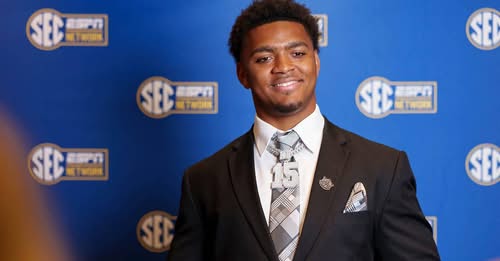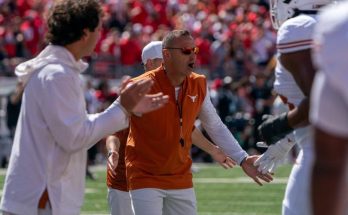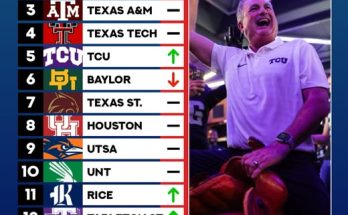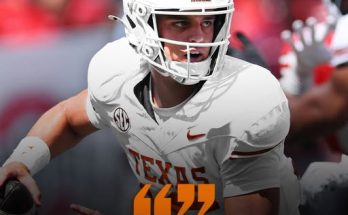The humid air of July in Auburn, Alabama, hangs heavy, a palpable weight that mirrors the expectations settling on the shoulders of the Tigers’ football program. Yet, amidst the fervent anticipation for the 2025 season, one voice cuts through the mugginess with an almost defiant confidence, a declaration that resonates far beyond the practice fields of the Plains. That voice belongs to Keldric Faulk, the imposing defensive lineman who, at SEC Media Days, offered a succinct yet profound preview of what he believes the 2025 Auburn defense will embody: “I feel our defense could be the best in the country, in my opinion. I want us to be known as the most physical group on the field.”
Faulk’s words are not mere bravado; they are a gauntlet thrown, a challenge laid bare for every opponent and a rallying cry for his teammates. They speak to a deeper philosophy, a commitment to a brand of football that is as old as the game itself: dominance born from sheer physicality. In a sport increasingly characterized by offensive explosions and intricate schemes, Faulk’s emphasis on the fundamental, almost primal, aspect of physicality offers a refreshing and compelling vision. But what does it truly mean to be the “most physical group on the field,” and what groundwork has been laid for Auburn to potentially achieve this lofty goal and claim the title of the nation’s best defense?
To understand the weight of Faulk’s statement, we must first delve into the player himself. Keldric Faulk is not just any defensive lineman; he is a burgeoning superstar, a player who has consistently exceeded expectations since arriving on the Plains. Recruited as a consensus four-star prospect out of Highland Home, Alabama, Faulk’s high school film showcased an athletic, long pass rusher with an impressive frame and versatility. He was a two-way player, even catching passes, demonstrating a rare blend of size, coordination, and fluid athleticism. At over 6-foot-5 and around 288 pounds, with an 81-inch wingspan, he possesses the ideal build for a disruptive force on the defensive line. His commitment to Auburn, flipping from Florida State, was a significant win for Hugh Freeze’s new staff, signaling a commitment to retaining top in-state talent.
Faulk wasted no time making an impact. As a true freshman in 2023, he played in every game, recording 35 tackles and earning SEC All-Freshman honors. He quickly demonstrated an innate ability to generate pressure, tallying 20 quarterback pressures, the most by a true freshman at Auburn in at least the past decade. This early success set the stage for a breakout sophomore campaign in 2024. Despite being hampered by an injury midway through the season, Faulk’s production soared. He amassed 45 total tackles, a remarkable 11.0 tackles for loss, and 7.0 sacks. His 45 pressures ranked eighth in the SEC, cementing his status as one of the most intimidating defensive linemen in the country. He earned SEC Defensive Lineman of the Week honors after a standout performance against Kentucky and delivered a game-wrecking outing against archrival Alabama, with 6 tackles, 2 TFLs, and a forced fumble and recovery. NFL scouts are already circling his name, with many projecting him as a potential first-round pick in the upcoming 2026 NFL Draft. His combination of size, power, and surprising movement skills makes him a true defensive cornerstone, capable of dominating both the run and the pass. He’s not merely a pass-rushing specialist; he’s a three-down impact player, a rare commodity in modern college football.
Faulk’s development from a raw but talented freshman to a projected NFL star is a testament not only to his personal dedication but also to the coaching staff’s ability to unlock his potential. This brings us to the architectural blueprint of Auburn’s defense under defensive coordinator D.J. Durkin. Entering his second season as defensive coordinator under Hugh Freeze, Durkin’s scheme for 2025 is expected to feature a 3-3-5 alignment. While on paper this might suggest a three-man front, the “Buck” position operates as a hybrid edge rusher, often giving the defense the appearance of a four-man front. This scheme is designed to create disruption and pressure, relying heavily on the athleticism and versatility of its defensive linemen and linebackers. For this system to thrive, high-level production from the front three (or effectively four, with the Buck) is paramount. Faulk, as the undeniable anchor of this defensive front, is central to its success.
The emphasis on physicality within Durkin’s scheme is evident. A 3-3-5, when executed properly, can be incredibly aggressive, allowing linebackers to flow freely to the ball and defensive linemen to penetrate gaps and disrupt offensive plays at the line of scrimmage. It demands players who are not afraid to engage, shed blocks, and deliver punishing hits. This aligns perfectly with Faulk’s vision of Auburn being the “most physical group on the field.” Physicality in football encompasses several key elements:
- Dominance at the Line of Scrimmage: This means controlling the trenches, winning individual matchups, and consistently getting penetration to disrupt running plays and pressure the quarterback. Faulk himself excels here, showcasing a good first step, excellent body and foot quickness, and the ability to win with his athleticism and length. His run defense has been particularly devastating, playing with natural leverage and consistently setting a firm edge.
- Tackling Efficiency: Being physical also means wrapping up and bringing down ball carriers consistently, minimizing yards after contact. This requires proper technique, strong fundamentals, and a relentless pursuit to the ball.
- Explosiveness and Burst: The ability to explode off the line, close on ball carriers, and deliver powerful blows. Faulk’s burst to close ability and backside pursuit are notable examples of this.
- Mental Fortitude and Relentless Motor: True physicality isn’t just about size or strength; it’s also about a mindset. It’s about playing with an unyielding motor from snap to whistle, making plays late in games when opposing linemen start wearing down. Faulk is known for his unrelenting motor, which allows him to make impact plays deep into games.
- Impactful Striking: Delivering hits that jar the ball loose, create fumbles, and send a clear message to the opposition. This is a hallmark of truly physical defenses.
Auburn’s defensive line, even beyond Faulk, is brimming with promising talent. The return of players like Keyron Crawford and Amaris Williams, combined with the addition of impressive true freshmen such as Jared Smith and Antonio Coleman, provides Durkin with a deeper and more versatile rotation. The staff’s focus on adding “big athletes” to the defensive line is a clear indicator of their commitment to building a physically dominant unit. The deeper rotation will be crucial, allowing Faulk and others to stay fresh throughout games and late into the season, maximizing their impact and reducing the risk of fatigue-related injuries or diminished performance.
Beyond the defensive line, Auburn’s secondary, which in 2024 was comprised mostly of freshmen and second-year players, now boasts another year of maturity and experience. This seasoned group, combined with an influx of new talent, is expected to take a significant leap forward. A strong secondary is vital for any top defense, as it allows the front seven to take more calculated risks in generating pressure, knowing that coverage will hold up. The growth and development of these young defensive backs will be critical in supporting Faulk’s vision of a top-tier defense.
Faulk’s personal growth and leadership also play a significant role in Auburn’s defensive aspirations. He has embraced a more vocal leadership role within the locker room, understanding that his words carry weight. As he himself stated, “A lot of them [2024 leaders] left, and they were one of the most vocal ones on the team, so I had to take over that role of just being a little more vocal, letting people hear my voice because a lot of people like to say when the team hear my voice, a lot of people liste1n.” This maturity and willingness to lead are invaluable assets, especially for a unit striving for national recognition. It’s not just about individual talent; it’s about cohesion, communication, and collective belief, all fostered by strong leadership.
The stakes for the 2025 season are high for Auburn. Head coach Hugh Freeze has consistently emphasized that year three would be a pivotal point for the program, a time when the roster overhaul and recruiting efforts would begin to truly bear fruit. The Tigers have indeed brought in two top-10 recruiting classes and addressed key positions through the transfer portal. Freeze and the team are embracing the heightened expectations, viewing them not as pressure but as a reflection of what Auburn football should be. As Freeze himself noted, “Man, I embrace the expectations, all of them. You should have them there. And I think every season you should have expectations. But the exciting thing now is I really like this locker room and I like the kids. I like coaching them, and I think we are primed. It’s time now to be in every game and then start finding a way to win them by doing the little things better that we didn’t last year.”2
Winning those close games, a struggle for Auburn in recent seasons, often comes down to fierce defense, red zone efficiency, and turnover margin. Faulk’s commitment to a dominant, physical defense directly addresses one of these critical areas. A defense that consistently stops the run, pressures the passer, and forces turnovers changes the complexion of games, shifting momentum and creating opportunities for the offense. Last season, Auburn was -9 in turnover differential, tied for 119th in the nation, a statistic that undoubtedly contributed to their struggles in tight contests. A more physical and disruptive defense, as envisioned by Faulk, is inherently more likely to generate turnovers, thus directly impacting the team’s ability to close out games.
Looking across the college football landscape, the competition for the title of “best defense in the country” is fierce. Teams like Alabama, Texas, Clemson, Georgia, and Penn State consistently field elite defensive units, driven by top-tier talent and innovative coaching. Alabama, despite a coaching change, still boasts an incredibly deep and talented defense, particularly along the defensive line and in the secondary. Texas, with its formidable back-seven, and Clemson, with one of the nation’s best defensive lines, are perennial contenders. Georgia, under Kirby Smart, always produces elite defensive results, even after losing significant talent to the NFL. Penn State’s defensive line and secondary are consistently among the nation’s best. For Auburn to truly claim the top spot, they will need to outperform these established powerhouses, not just in flashes but consistently, week in and week out, against some of the most potent offenses in the country.
The “best in the country” isn’t merely about statistics; it’s about impact, consistency, and championship-level play. It means shutting down opponents when it matters most, forcing crucial turnovers, and dominating in high-pressure situations. It requires a collective effort, where every player understands their role and executes with precision and ferocity.
Faulk’s statement is not just a prediction; it’s a mission statement. It encapsulates the ethos that Hugh Freeze and D.J. Durkin are striving to instill in the Auburn program. It speaks to a commitment to fundamental football, where toughness, discipline, and a relentless pursuit of perfection define the defensive identity. The journey to becoming the best defense in the country is arduous, demanding countless hours of preparation, unwavering focus, and a willingness to embrace the grind. It requires a symbiotic relationship between coaching and player execution, where schemes are tailored to maximize individual strengths and players fully buy into the defensive philosophy.
For Keldric Faulk, and for Auburn, the 2025 season represents an opportunity to make a definitive statement. His confidence is infectious, and it reflects a belief that has been cultivated through hard work, a commitment to improvement, and the understanding that true greatness in football begins at the point of attack, with an unyielding commitment to physicality. If Auburn’s defense can indeed embody the “most physical group on the field” as Faulk envisions, then the claim of being the “best in the country” might not be just a hopeful declaration, but a tangible reality for the Tigers in 2025. The echoes of his words will resonate throughout the season, serving as a constant reminder of the standard they have set for themselves. The stage is set, the expectations are clear, and Keldric Faulk and the Auburn defense are ready to prove their bold declaration on the gridiron.



